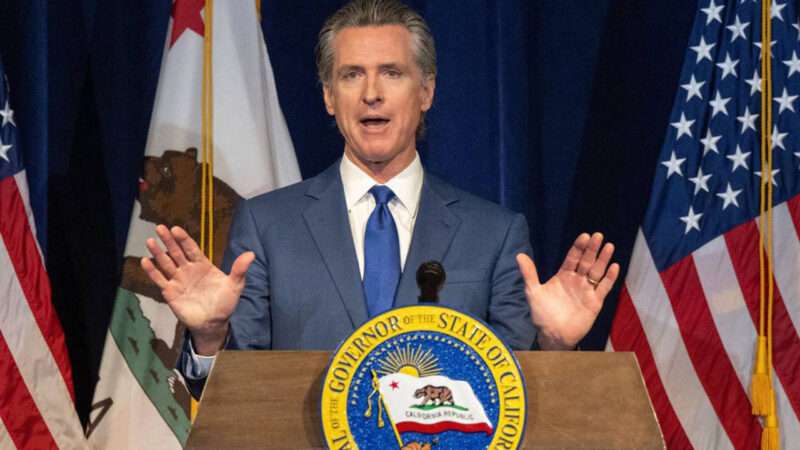
A California law that is scheduled to take effect on January 1 will impose a host of new restrictions on public possession of firearms. That may seem counterintuitive, since Senate Bill 2 is the state legislature's response to the U.S. Supreme Court's June 2022 ruling in New York State Rifle & Pistol Association v. Bruen, which upheld the Second Amendment right to carry guns for self-defense outside the home. But California, like several other states with discretionary carry-permit policies that had to be revised because of Bruen, is attempting an end run around that decision by simultaneously making permits easier to obtain and much harder to use.
In Bruen, the Supreme Court said states may not require permit applicants to demonstrate "a special need for self-protection distinguishable from that of the general community." Accordingly, S.B. 2, which Gov. Gavin Newsom signed into law on September 26, eliminates California's "good cause" requirement, along with a similarly amorphous "good character" criterion (although it still disqualifies applicants deemed "reasonably likely" to pose a danger to themselves or others). By limiting the discretion of licensing authorities, S.B. 2 notes, those changes could have opened the door to "broadly allowing individuals to carry firearms in most public areas." Deeming that outcome intolerable, legislators instead decreed that guns may not be carried in most public areas.
Copying the constitutionally dubious approach taken by states such as New York, New Jersey, Maryland, and Hawaii, S.B. 2 designates myriad locations as "sensitive places" where guns are not permitted. It also establishes a default rule that people may not bring guns into a business unless the owner "clearly and conspicuously posts a sign at the entrance of the building or on the premises indicating that licenseholders are permitted to carry firearms on the property."
As a federal lawsuit challenging those rules notes, the law "turns the Bruen decision on its head, making nearly every public place in California a 'sensitive place' (in name only)" and "forbidding firearm carry even after someone has undertaken the lengthy and expensive process to be issued a concealed handgun license." California's gun-free zones "include every park and playground, every hospital, all public transportation, any place that sells alcohol (which, in California, includes most gas stations and convenience and grocery stores), all land under the control of the Department of Parks and Recreation or the Department of Fish and Wildlife (with exceptions for hunting), libraries, churches, banks, and many more." S.B. 2 "even transforms private businesses into 'gun-free zones' by default, imposing an unprecedented affirmative duty on private business owners to post signage to authorize people exercising an enumerated constitutional right to enter the property."
As a result, says the complaint in May v. Bonta, "Californians who desire to exercise their enumerated right to carry are essentially limited to some streets and sidewalks (so long as those public places are not adjacent to certain other 'sensitive' places), plus a few businesses willing to post a 'guns allowed' sign at the risk of potentially losing other customers by doing so." The law "creates a patchwork quilt of locations where Second Amendment rights may and may not be exercised, thus making exercise of the right so impractical and legally risky in practice that ordinary citizens will be deterred from even attempting to exercise their rights in the first place."
Under Bruen, California will have to show that its restrictions are "consistent with this Nation's historical tradition of firearm regulation." In this context, the lawsuit says, that means "all law-abiding, competent adults" have "the right to carry firearms and ammunition for self-defense in all public areas that have not historically been considered 'sensitive places' or their modern analogues based on relevant history."
Before S.B. 2 was enacted, federal judges had concluded that similar restrictions in New York and New Jersey failed the Bruen test. While California legislators were considering S.B. 2, a federal judge in Hawaii issued a temporary restraining order against several of that state's location-specific gun bans. Three days after Newsom signed S.B. 2, a federal judge blocked enforcement of Maryland's restrictions on firearms near public demonstrations, its ban on carrying guns in bars and restaurants that serve alcohol, and its presumptive rule against guns in other businesses open to the public.
Unfazed by those warnings, California is forging ahead with a policy that defies Bruen while pretending to comply with it. At a February 1 press conference announcing the introduction of S.B. 2, its supporters lamented the "radical Bruen ruling" and the resulting "flood of applicants" for carry permits while expressing the hope that the bill would mitigate the "disastrous effect of the Bruen decision." As the complaint in May v. Bonta notes, Newsom himself called Bruen "a very bad ruling" and "used air quotes when discussing the 'right' to carry firearms outside the home, making his contempt for the Constitution clear."
The post California Defies SCOTUS by Imposing Myriad New Restrictions on Public Gun Possession appeared first on Reason.com.







